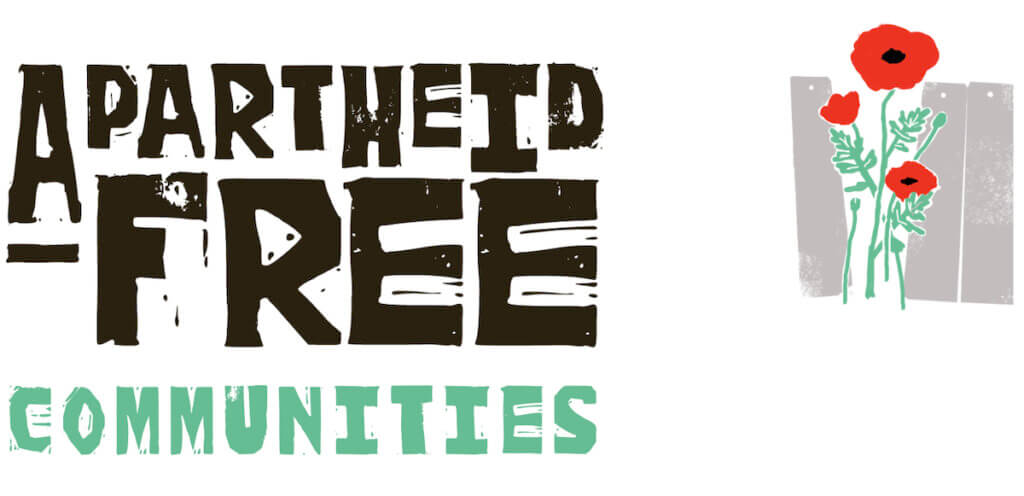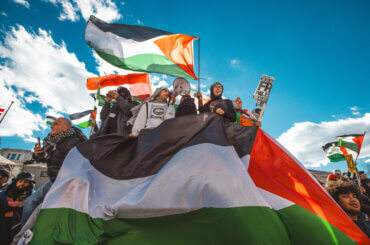A new initiative to build a North American movement to end Israeli apartheid formally launches today, on the 56th anniversary of Israel’s occupation of the West Bank and Gaza. Apartheid-Free Communities is calling faith communities and communities of conscience to “step away from any and all support to Israeli apartheid, occupation, and settler colonialism,” according to its website.
“We ask ourselves and our communities to take a renewed public pledge against all forms of racism, bigotry, and oppression, including against racist discrimination, Islamophobia, antisemitism, and xenophobia in our own communities,” leaders of the campaign write.
Following reports from human rights groups declaring that Israel’s laws, policies and practices amount to the Crime of Apartheid, the American Friends Service Committee (AFSC) convened a coalition of faith communities in 2022. The interdenominational group—“inspired by the anti-Apartheid movement that toppled the Apartheid regime in South Africa”—established the new initiative and created the following pledge:
WE AFFIRM
our commitment to freedom, justice, and equality for the Palestinian people and all people;
WE OPPOSE
all forms of racism, bigotry, discrimination, and oppression; and
WE DECLARE
ourselves an Apartheid-free community and to that end,
WE PLEDGE
to join others in working to end all support to Israel’s Apartheid regime, settler colonialism, and military occupation.
Individuals are encouraged to use the pledge in their faith communities, unions, campus groups, universities, businesses, corporations and other organizations as a way to build understanding and support for ending Israeli apartheid.
Dr. Peter E. Makari, Global Relations Minister, Middle East and Europe for the Global Ministries of the Christian Church (Disciples of Christ) and United Church of Christ, said of the initiative, “It is imperative that we name the reality of laws and practices for what it is: apartheid—both as an international legal definition and as our moral responsibility to speak truth—as we accompany partners in their struggle for justice.”
Last month, Jennifer Bing, Director of the Palestine Activism program at AFSC, co-led a delegation of clergy and faith-based organizers to Palestine where they witnessed the effects of apartheid and shared news of the campaign with activists. “On our trip, we visited Palestinian communities in the West Bank and inside Israel—in Lyd, Jaffa, Nazareth—and unrecognized Palestinian villages in the Naqab/Negev desert,” Bing told Mondoweiss. “And we connected to Palestinians in Gaza remotely, even as they endured the drone strikes and Israeli military escalation.”
Bing, who began her advocacy for Palestinian children after working as a teacher in a Quaker school in Ramallah during the first Palestinian uprising, said, “On our delegation, we were inspired by the artists, the storytellers, the human rights defenders, the parents, the youth, the elders who continue to rebuild and stay rooted in their homeland. And yet we also felt deep anguish at the brutality of decades of systematic violence and repression funded in part by our government.”
“We came home knowing witnessing is not enough. . . More collective action is needed to dismantle apartheid.”
Jennifer Bing
“We came home,” she said, “knowing that witnessing is not enough, that more people must be educated, more collective action is needed to dismantle apartheid.”
According to the coalition’s website, embracing the pledge “states our collective opposition to apartheid, settler colonialism, and military occupation, and clearly puts forth our commitment as a community to take action against these crimes.”
Recognizing that “no one [or organization] will ever be fully free of apartheid until there is freedom and equality for all people,” the pledge is described as aspirational. According to the website, each organization is encouraged to find its way forward in fulfilling its pledge, “discerning context-specific ways… to support Palestinians in their quest for self-determination.”
“Whether your community is committed to learning more about Israel’s apartheid regime, is already advocating for justice, or is working to end complicity,” the website clarifies, “signing this pledge connects you to a network of communities committed to the work of justice, freedom, and equality for Palestinians and all people.”
Many resources are available on the website: graphics, links to videos and statements describing Israeli apartheid and international law, an FAQ, and the list of current signatories (over 70 “communities” at this time).
“Let’s build an Apartheid-Free world, starting with our own communities…,” campaign organizers write, “We need to educate ourselves and others about racist laws and state systems at home and abroad, and we want to ensure that our communities do not contribute to the maintenance of Apartheid regimes. Together, we can work to promote freedom, justice, and equality for all.”
You can register for the 8 p.m. ET webinar launch here.



Brent,
To answer your good question, like all national liberation struggles, the Palestinian one is compelled by circumstances and the historical example of NLS before it, to master all forms of struggle. Armed resistance is very much a part of it if for no other reason than the fact that the Israeli Apartheid regime has closed the door to peaceful means of protest in the West Bank and Gaza and left very little space for that west of the so-called Green Line (pre-1867 Israel).
It is asked by many, how can small groups of lightly armed, untrained, urban resistance fighters organized as small tactical brigades possible take on the Israeli military, border guards, police and Shin Bet? Of course, they are outgunned and outmanned. It does indeed look like an unfair fight. But in not a single national liberation movement in modern times have the armed resistance fighters been a serious match for the military forces of the incumbent regimes that they sought to topple.
Thus, what is the point of armed resistance to Israeli apartheid? Is it futile? The role it plays in the current context of political and economic turmoil in the Israeli Jewish sector is to undermine the willingness and desire of the soldiers of the Zionist apartheid regime to fight knowing that each time they go into the refugee camps and cities of the northern West Bank to make arrests and assassinate fighters, they will face a wall of fire and extended fire fights where for the first time, their lives are at risk, not just the fighters’ and residents’. In the past, the occupation forces enjoyed a five-star occupation with no serious challenge to their abuses. Now that has changed. Other important roles of armed resistance are to inspire the Palestinian People throughout historic Palestine to join the fight in any way they choose to resist the occupation and the apartheid system, and to open the eyes of Israelis, Arabs citizens throughout the Arab World, and international public opinion to the realities of Israeli apartheid and war crimes. They will come to appreciate the bravery of a people determined to defy tyranny and free themselves from oppression at whatever cost..
Therefore, it is my humble opinion that armed resistance helps end apartheid.
Will armed resistance help end apartheid or reinforce it?